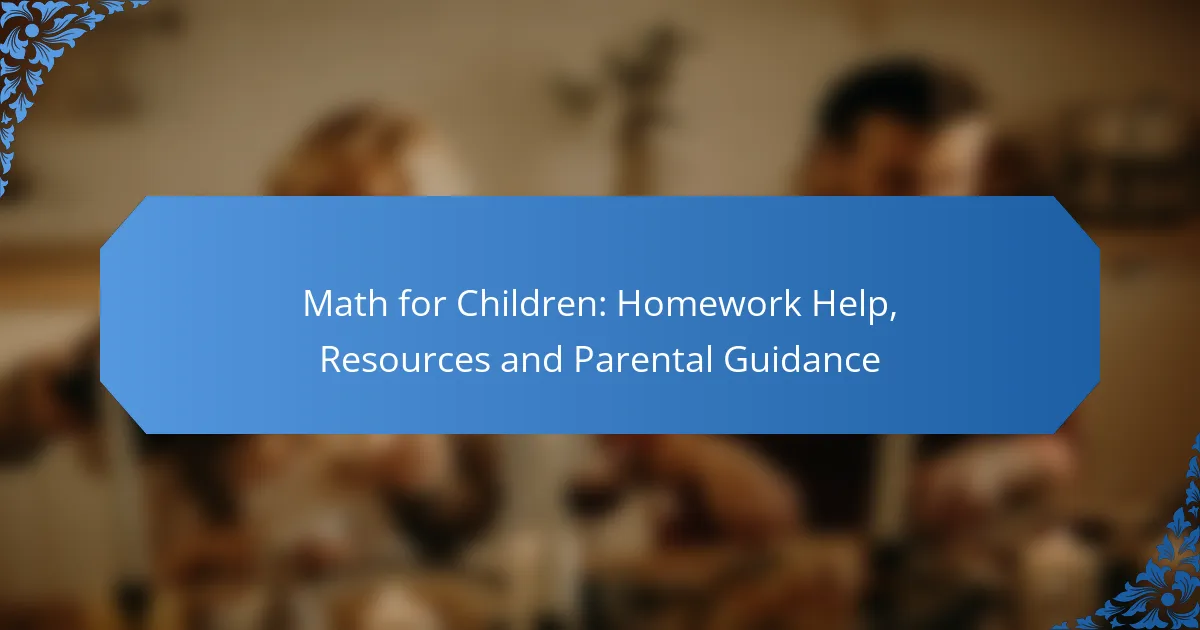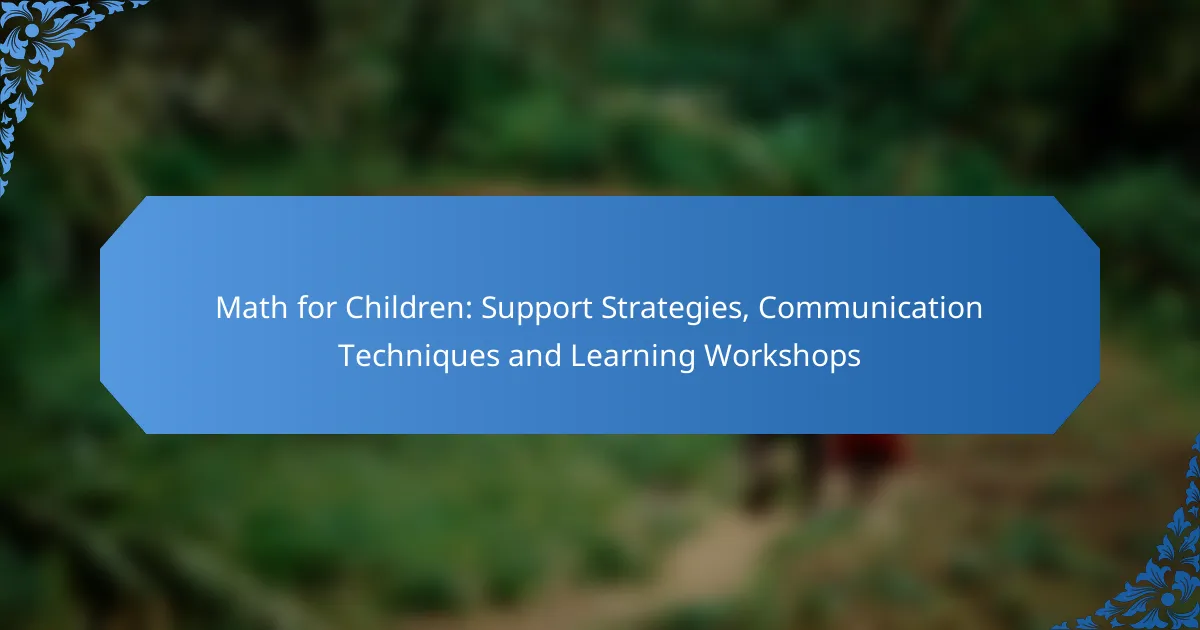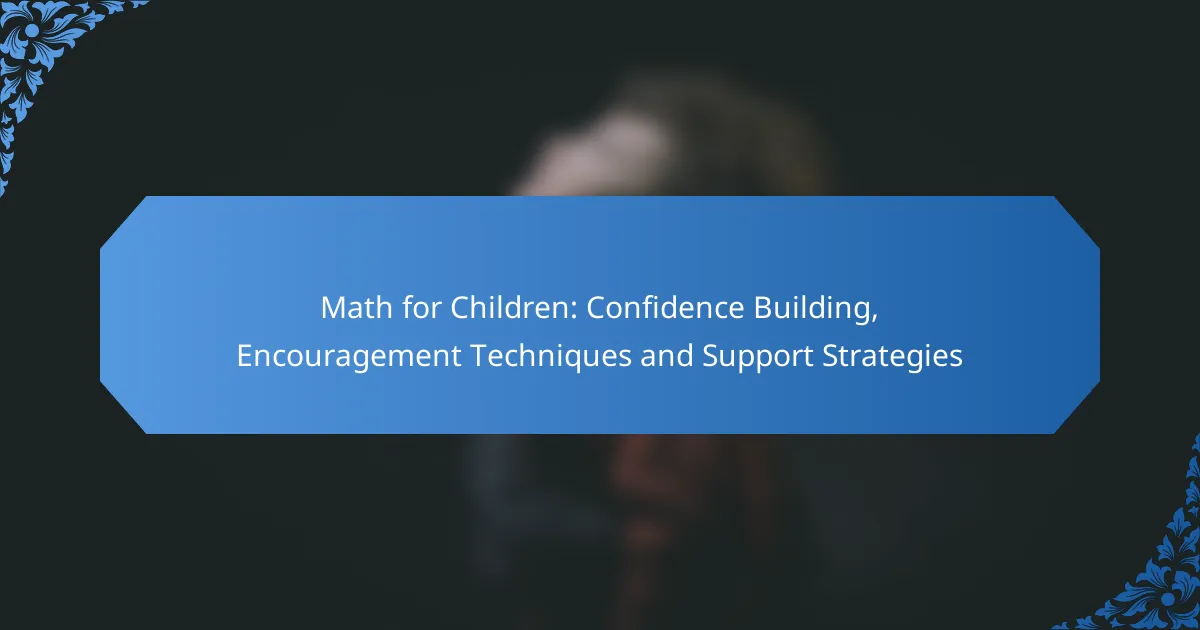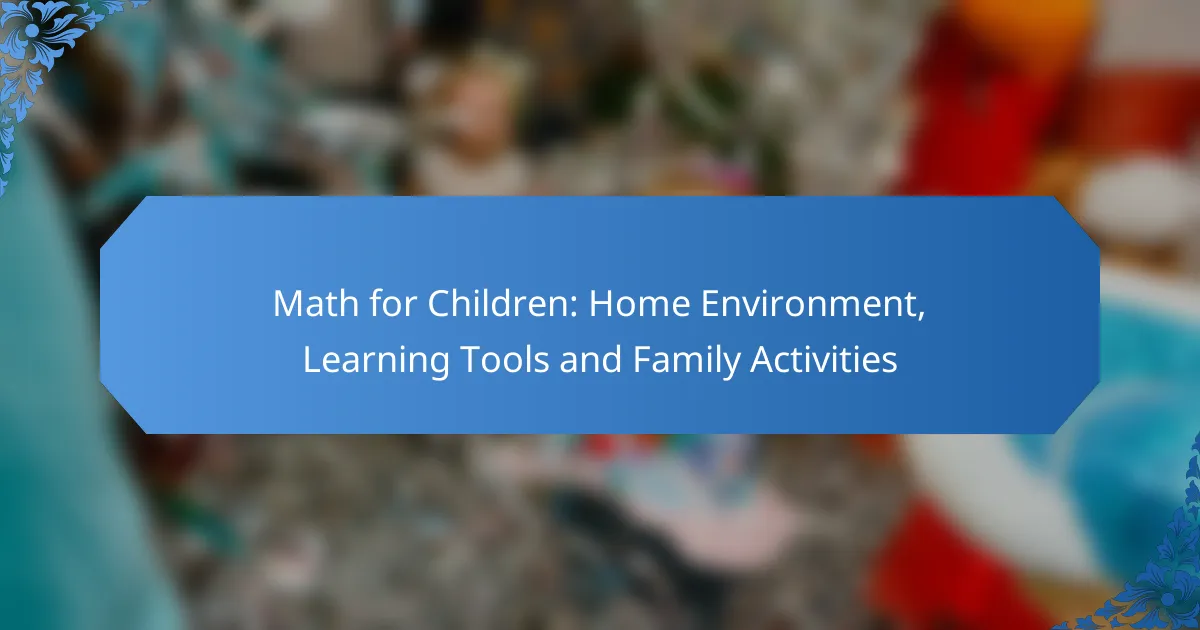Helping children with math can be a rewarding experience that enhances their understanding and performance. With a variety of online courses, educational websites, and printable materials available, parents can provide valuable support and resources tailored to their child’s learning style. By actively engaging in their child’s education and fostering a positive attitude towards math, parents can significantly boost their child’s confidence and skills in the subject. For more ideas, check out math for children workshops that includes home environment, learning tools, and family activities.
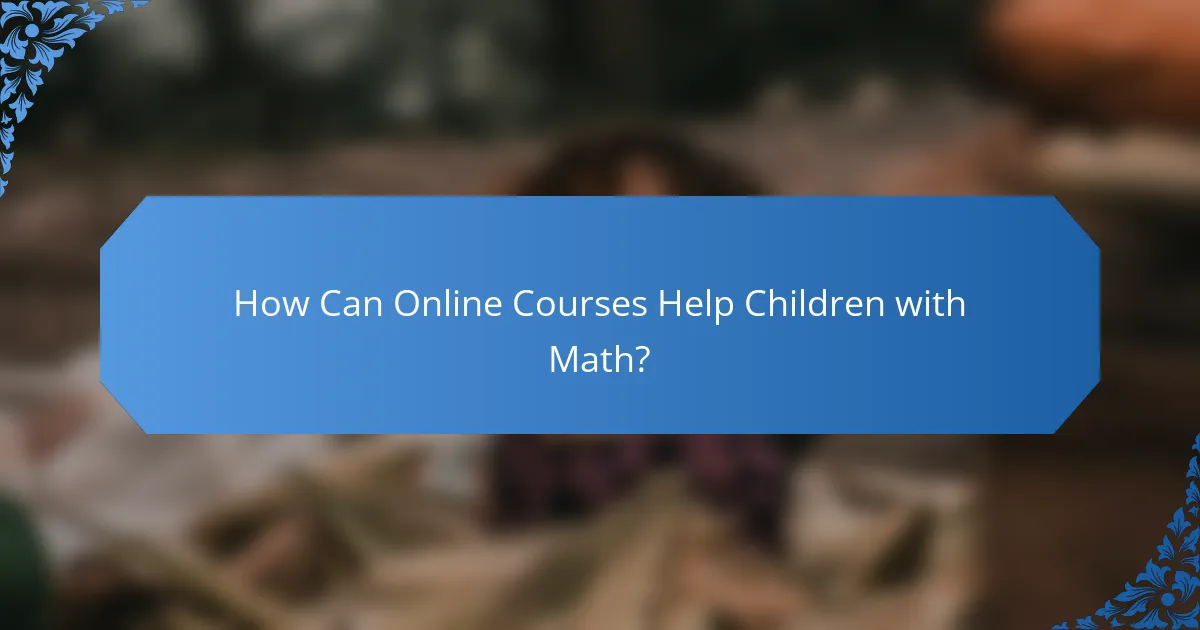
How Can Online Courses Help Children with Math?
Online courses can significantly enhance children’s math skills by providing flexible, engaging, and tailored learning experiences. These platforms offer various resources that cater to different learning styles, making math more accessible and enjoyable for young learners.
Interactive learning platforms
Interactive learning platforms engage children through games, simulations, and hands-on activities that make math concepts more relatable. These platforms often include features like instant feedback, which helps students understand their mistakes and learn from them immediately.
Examples of popular interactive platforms include Khan Academy and IXL, which offer a range of math topics suitable for various grade levels. Parents should consider platforms that align with their child’s curriculum to reinforce what they learn in school.
Personalized tutoring sessions
Personalized tutoring sessions allow children to receive one-on-one attention tailored to their specific needs. Tutors can identify areas where a child struggles and focus on those topics, providing targeted support that traditional classrooms may not offer.
Many online tutoring services, such as Chegg Tutors or Wyzant, allow parents to choose tutors based on their child’s learning style and personality. It’s essential to monitor progress and adjust tutoring sessions as needed to ensure effective learning.
Engaging video lessons
Engaging video lessons can simplify complex math concepts through visual explanations and real-world applications. These videos often break down topics into manageable segments, making it easier for children to grasp difficult material.
Platforms like YouTube and educational websites often feature channels dedicated to math instruction. Parents should encourage their children to watch these videos and discuss the content to reinforce understanding and retention.
Practice exercises and quizzes
Practice exercises and quizzes are crucial for reinforcing math skills and assessing understanding. Many online courses provide a variety of practice problems that adapt to the child’s skill level, ensuring they are challenged appropriately.
Parents should encourage regular practice, aiming for short, focused sessions rather than long marathons. Setting aside time each week for quizzes can help track progress and identify areas needing further review.
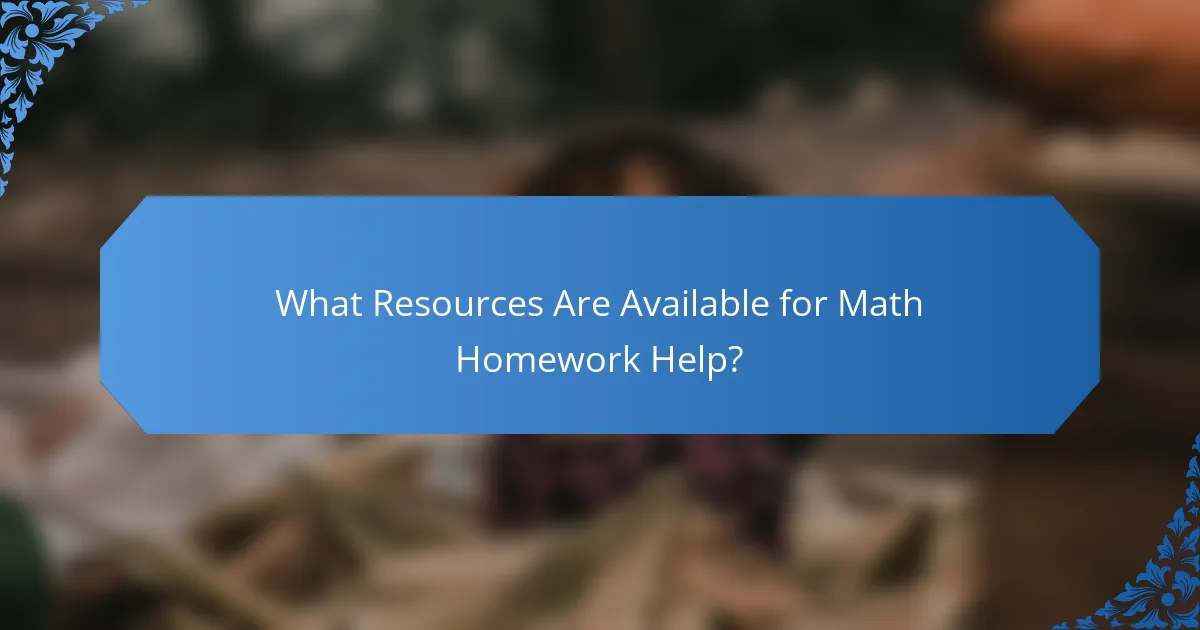
What Resources Are Available for Math Homework Help?
Numerous resources exist to assist children with math homework, including online tools, educational websites, and printable materials. These resources can help clarify concepts, provide practice, and support parental involvement in their child’s learning.
Online math problem solvers
Online math problem solvers are tools that allow students to input specific math problems and receive step-by-step solutions. Websites like Photomath and Wolfram Alpha can be particularly useful for understanding how to approach complex equations or word problems.
When using these tools, encourage children to focus on understanding the solution process rather than just copying answers. This approach fosters deeper comprehension and critical thinking skills.
Math-focused websites and apps
There are many math-focused websites and apps designed to make learning engaging and interactive. Platforms like Khan Academy and IXL offer lessons, practice exercises, and progress tracking tailored to various grade levels.
Parents should explore these resources to find ones that align with their child’s learning style. Many of these platforms offer free content, but some may require subscriptions for full access.
Printable worksheets and guides
Printable worksheets and guides provide hands-on practice that can reinforce math concepts learned in class. Websites like Education.com and Teachers Pay Teachers offer a variety of worksheets covering topics from basic arithmetic to advanced algebra.
When selecting worksheets, consider your child’s current curriculum and focus on areas where they may need extra practice. Regularly incorporating these materials can help solidify their understanding and boost confidence in math skills.
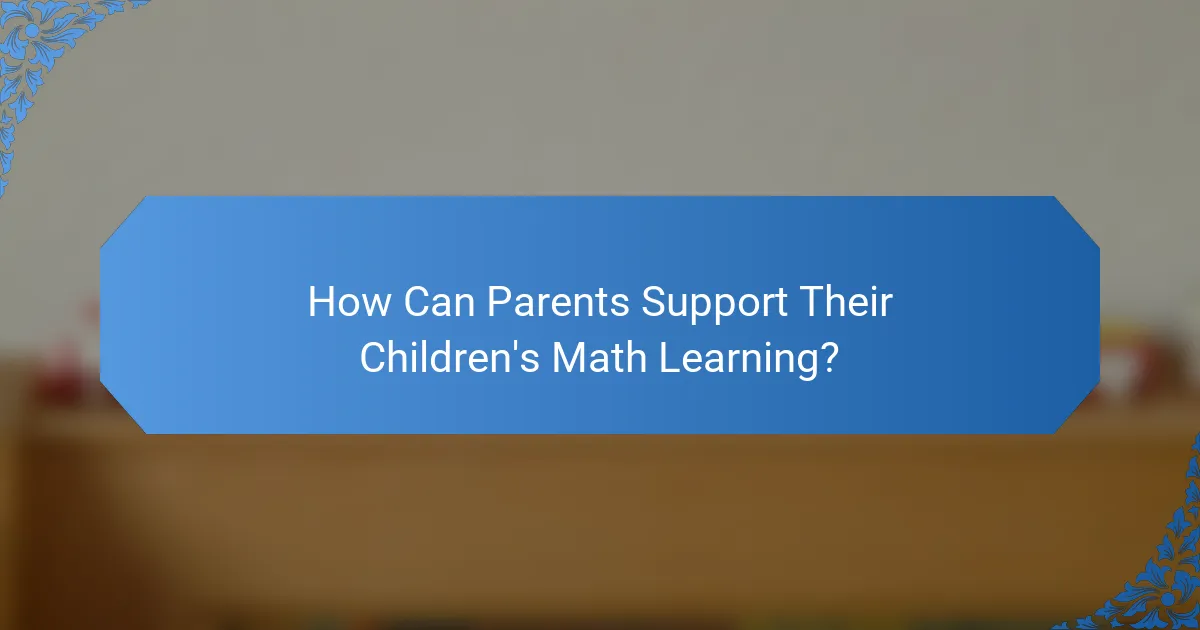
How Can Parents Support Their Children’s Math Learning?
Parents can significantly enhance their children’s math learning by providing support, resources, and encouragement. Engaging in their child’s education and fostering a positive attitude towards math can lead to improved understanding and performance.
Creating a conducive study environment
A conducive study environment is crucial for effective learning. Ensure that the study area is quiet, well-lit, and free from distractions like television or excessive noise. A dedicated space with all necessary supplies, such as pencils, paper, and a calculator, can help children focus better.
Consider personalizing the study area with motivational posters or math-related resources. This can create a more inviting atmosphere that encourages children to engage with their math homework.
Setting a regular homework schedule
Establishing a regular homework schedule helps children develop a routine that promotes consistency in their studies. Aim for a specific time each day dedicated to math homework, ideally when your child is most alert and focused.
Incorporate short breaks during study sessions to prevent fatigue. For example, a 25-minute study period followed by a 5-minute break can enhance concentration and retention of information.
Encouraging a growth mindset
Encouraging a growth mindset involves teaching children that their abilities can improve with effort and practice. Praise their hard work and perseverance rather than just their intelligence, reinforcing the idea that challenges are opportunities for growth.
Introduce them to stories of famous mathematicians who faced difficulties but succeeded through determination. This can inspire children to embrace challenges in their math learning journey.
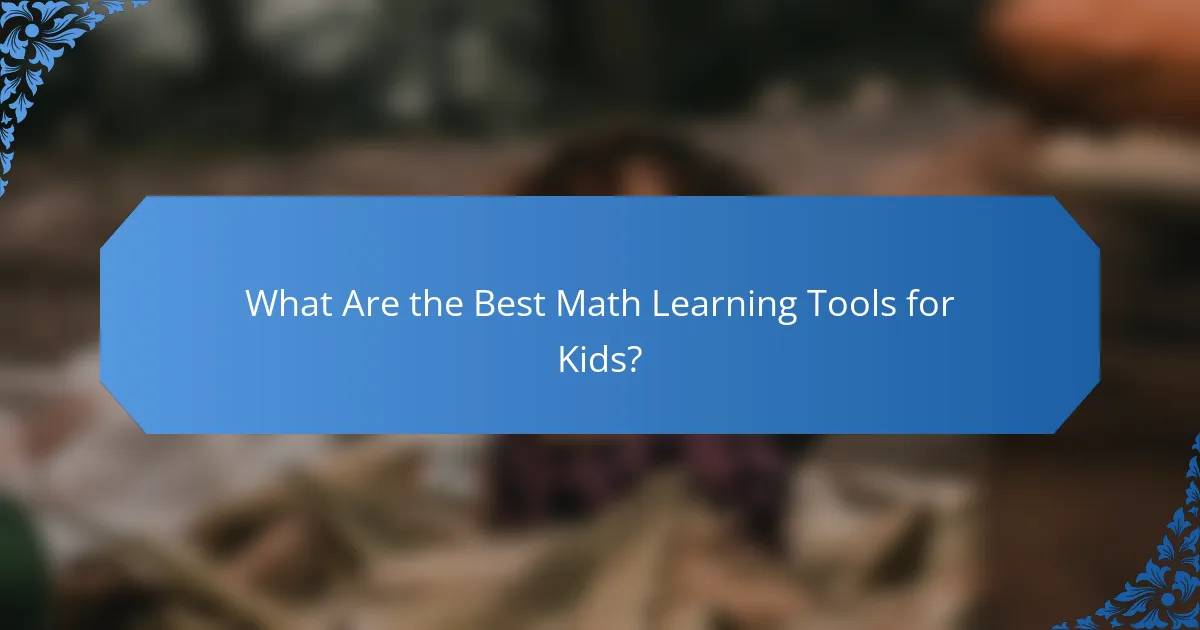
What Are the Best Math Learning Tools for Kids?
The best math learning tools for kids combine engaging content with effective teaching methods. These resources help children grasp mathematical concepts through interactive exercises and personalized learning experiences.
Khan Academy
Khan Academy offers a comprehensive platform with free resources for students of all ages. It includes instructional videos, practice exercises, and a personalized learning dashboard that tracks progress.
Students can explore various math topics, from basic arithmetic to advanced calculus, at their own pace. The platform is particularly beneficial for reinforcing classroom learning and providing additional support where needed.
IXL Learning
IXL Learning is a subscription-based service that provides a vast array of math practice questions tailored to different grade levels. The platform adapts to each student’s skill level, ensuring that they receive appropriate challenges.
With detailed explanations for each question, IXL helps students understand their mistakes and learn from them. Parents can monitor their child’s progress through comprehensive reports, making it easier to identify areas for improvement.
Prodigy Math
Prodigy Math is a game-based learning platform that makes math fun for kids. Through an engaging fantasy world, students solve math problems to progress in the game, which keeps them motivated and focused.
The platform aligns with common core standards, making it suitable for classroom use or homework help. Prodigy also allows parents to track their child’s performance and adjust settings to match their learning needs.

How to Choose the Right Math Course for Your Child?
Selecting the right math course for your child involves understanding their individual needs and the course’s alignment with educational standards. Consider factors such as learning styles, course content, and structure to ensure a good fit.
Assessing learning styles
Identifying your child’s learning style is crucial in choosing an appropriate math course. Some children thrive in visual environments, while others may prefer auditory or kinesthetic learning methods. For example, a child who learns best through visuals might benefit from courses that incorporate diagrams and videos.
Engage your child in discussions about their preferences and observe how they tackle math problems. This insight can guide you in selecting a course that matches their learning style, enhancing their understanding and retention of mathematical concepts.
Evaluating course content and structure
When evaluating math courses, consider the curriculum’s alignment with local educational standards, such as the Common Core in the United States or similar frameworks in other countries. Look for courses that cover essential topics like arithmetic, geometry, and algebra, ensuring they build progressively on previous knowledge.
Additionally, assess the course structure. A well-organized course should include a mix of theoretical concepts and practical applications. Check if it offers interactive elements, such as quizzes or group activities, which can foster engagement and reinforce learning.
